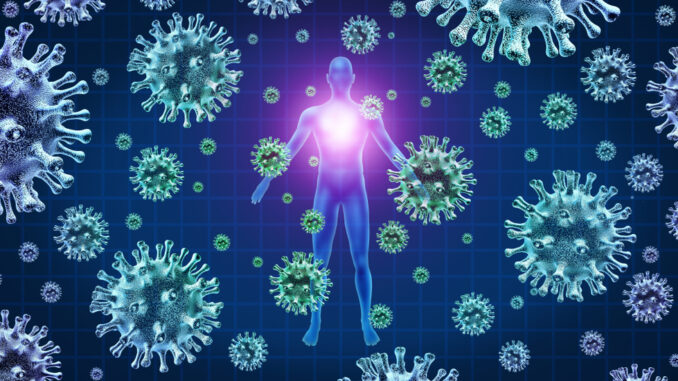
Kaleido Biosciences, Inc. (Nasdaq: KLDO), today announced positive interim results from the K031 non-IND controlled clinical study evaluating outpatients with mild to moderate COVID-19 disease. Patients in this non-IND clinical study were randomized within 48 hours of testing positive for COVID-19 to either receive Supportive Self Care (SSC) or SSC plus Microbiome Metabolic Therapy (MMT™) candidate KB109 for two weeks and then followed for an additional three weeks. The planned interim analysis comprised approximately half of the total study population (n=176) and showed that KB109 was well tolerated, with a safety profile consistent with previous studies of MMT candidates and no unexpected treatment-related adverse events. For subjects reporting one or more comorbidities, the median time to resolution of the thirteen overall COVID-19 related symptoms was 18 days with KB109 plus SSC and 27 days with SSC alone.
“This interim analysis, from the largest study conducted to date with an MMT candidate, reinforces the safety and tolerability previously observed with MMTs and provides a strong signal of clinical benefit for KB109,”
commented Dan Menichella, President and Chief Executive Officer of Kaleido.
“The study reveals that many patients with mild-to-moderate disease, and particularly those patients with a comorbidity, experience symptoms for a period of weeks. This study shows the significant burden experienced by these patients and we look forward to reporting the full dataset later this quarter.”
“These exciting and relevant data are in line with what we are seeing in the COVID-19 literature and suggests that the microbiome plays a role in this disease,”
said John P. Haran, M.D., Ph.D., associate professor of emergency medicine, microbiology & physiological systems and clinical director of the UMass Center for Microbiome Research at the University of Massachusetts Medical School.
“There is increasing evidence supporting the biological plausibility that microbiome restoration has a significant impact on different diseases and seeing an influence in COVID-19 patients with comorbidities aligns with this emerging science.”
Summary of Interim Results
- KB109 demonstrated a favorable safety and tolerability profile with no unexpected treatment-related adverse events or discontinuations related to treatment.
- Approximately 40 percent of the patients reported at least one comorbidity at baseline.
- The presence of comorbidity lengthened the time to resolution of symptoms, even in mild to moderate COVID-19 disease. In the SSC alone arm, median time to resolution of the thirteen overall COVID-19 related symptoms in patients with no comobitities was 14 days as compared with 27 days in patients with at least one comorbidity.
- No difference in median time to resolution of symptoms was observed with KB109 plus SSC for the overall population, although small differences between the arms were observed during the follow-up period.
- Median time to resolution of the thirteen overall COVID-19 related symptoms for patients with one or more comorbidity at baseline was 18 days for the KB109 plus SSC group as compared with 27 days with SSC alone.
- Kaleido also evaluated eight cardinal COVID-19 related symptoms as defined by the Centers for Disease Control and Prevention, which showed median time to resolution of symptoms among patients with one or more comorbidity at baseline was 15 days for the KB109 plus SSC group as compared with 27 days with SSC alone.
The K031 study of 350 subjects is fully enrolled with results expected in the first quarter of 2021. Topline data from a smaller 50 subject study of KB109 is also expected in the first quarter of 2021.
About the Potential Role of the Microbiome in COVID-19
COVID-19 infection has been associated with activation of an inappropriate inflammatory cascade, which in some patients can cause an abnormally aggressive immune response that can lead to pneumonia and respiratory failure. Metabolites such as short chain fatty acids (SCFAs) produced by the microbiome through utilization of glycans are modulators of the immune response and therefore could play a role in limiting this inflammatory cascade.
In preclinical models, increased SFCAs and/or SFCA-producing taxa, have been shown to influence immune pathways, mitigate immune pathology, and improve survival and morbidity associated with severe respiratory viral infections.1,2 Commensal microbiota composition critically regulates the generation of virus-specific CD4 and CD8 T cells and antibody responses following respiratory influenza virus infection.3
In-human data also support the role of SCFAs in reducing the impact of viral infections. In patients undergoing hematopoietic stem cell transplants who have contracted respiratory viral infections, including coronavirus, the presence of SCFA-producing taxa has been associated with a significantly reduced risk of progression to lower respiratory tract infections, which can have substantial morbidity in this patient population.4 KB109 is Generally Recognized as Safe (GRAS) and was selected for evaluation in these COVID-19 clinical studies based on its demonstrated ability to increase production of SCFAs as well as to promote commensal bacteria and reduce pathogenic bacteria ex vivo.

